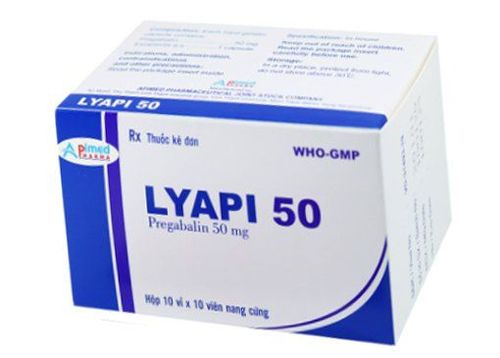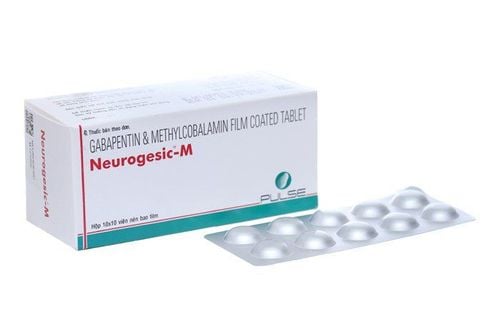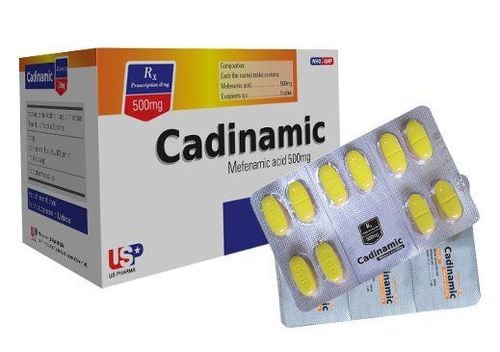This is an automatically translated article.
Neuropain drug is made in the form of hard capsules, with the main ingredient being Pregabalin. It is used in the treatment of neuropathic pain and partial status epilepticus.
1. What are the effects of Neuropain?
Neuropain 100mg drug has the main ingredient Pregabalin 100mg with the following uses:
Treatment of pain due to nerve causes: postherpetic neuralgia, diabetic peripheral neuritis; Adjuvant treatment in partial seizures, with or without general therapy in patients over 12 years of age; Treatment of fibromyalgia; Treatment of generalized anxiety disorder. Neuropain is contraindicated in people with hypersensitivity to Gabapentin or other components of the drug.
2. Dosage of Neuropain
Dosage: 150 - 600mg / day, divided into 2 - 3 times. Specifically:
Pain of nerve origin: Start with a dose of 150mg/day, divided into 2-3 times. After 3-7 days, the dose can be increased to 300mg/day depending on the patient's tolerance and response. If necessary, the dose may be increased to a maximum of 600 mg after the next 7 days; Seizures: Start with a dose of 150mg/day, divided into 2-3 doses. After 1 week, the dose may be increased to 300 mg/day depending on the patient's tolerance and response. If necessary, the dose may be increased to a maximum of 600 mg after the next 1 week; Generalized Anxiety Disorder: Initially 150mg/day, after 1 week can be increased to 300mg/day depending on patient's tolerance and response. If necessary, it may be increased to 450 mg/day, up to a maximum of 600 mg/day at subsequent 1-week intervals. Missed dose: If you forget to take a dose of Neuropain, you should take it as soon as you remember. If it is almost time for the next dose, skip the missed dose and just take the next dose on schedule.
Overdose: If using Neuropain drug overdose, the patient should notify the doctor immediately. In case of any abnormal symptoms, the patient should be hospitalized immediately for prompt treatment.
3. Neuropain side effects
Some side effects that patients may experience when using Neuropain include:
Nervousness: nystagmus, fatigue, loss of coordination, dizziness, memory loss, edema, drowsiness, ... Children from 3 to 12 years old may experience neurological problems such as anxiety, fussiness, oppositional attitudes, agitation, feelings of euphoria or depression,...; Digestive: Dry mouth, indigestion, abdominal pain, constipation, diarrhea; Cardiovascular: Peripheral angioedema; Respiratory: Cough, pneumonia, rhinitis, pharyngitis - oropharynx; Eyes: Decreased vision, double vision; Musculoskeletal: Joint pain, myalgia; Skin: Skin rash, rash; Blood: Leukopenia; Other side effects: Viral infection, impotence, increased appetite, insomnia, disorientation, ataxia, tremor, dysarthria, paresthesia, sedation, lethargy, headache, vestibular disorders , vomiting, feeling drunk, weight gain, withdrawal syndrome,... When experiencing side effects of Neuropain, patients should promptly notify their doctor for advice on appropriate treatment.
4. Be careful when using Neuropain
Some notes for patients to remember before and during the use of Neuropain are:
Caution when using Neuropain in patients with a history of mental disorders, people with impaired kidney function and hemodialysis, disease people with diabetes, have cardiovascular disease, the elderly, people who operate machinery or drive vehicles; Neuropain may cause a false positive in proteinuria in patients taking Gabapentin; Neuropain side effects are usually mild or moderate, tending to subside within 2 weeks of continuing treatment. Uncoordinated movement is dose related. If dose reduction does not help, the drug should be discontinued; If Stevens-Johnson syndrome is suspected, the drug should be discontinued. Neuropain should not be stopped abruptly because it may increase the frequency of seizures. Before discontinuing or switching to another antiepileptic drug, the patient should reduce the dose slowly over a minimum of 7 days; Stop using Neuropain immediately if the patient has symptoms of angioedema; Control signs, intentions and behaviors of suicide or substance abuse; The safety and effectiveness of Neuropain has not been evaluated in children under 17 years of age; You should consult your doctor before using Neuropain in pregnant and nursing women.
5. Neuropain drug interactions
Some drug interactions of Neuropain include:
When used concurrently, Gabapentin does not change the pharmacokinetics of other antiepileptic drugs such as: valproic acid, carbamazepine, phenytoin, phenobarbital, diazepam; Antacids reduce the bioavailability of gabapentin by about 20% by affecting its absorption. Gabapentin should be administered at least 2 hours after antacids; Pregabalin may increase the effects of ethanol and lorazepam; Pregabalin aggravates cognitive and motor impairment induced by oxycodone. When using Neuropain, patients should strictly follow the doctor's instructions. If you experience any side effects, the patient should immediately inform the doctor to receive appropriate advice. Patients must absolutely not increase or decrease the dose on their own to avoid the risk of serious side effects that threaten health.
Please dial HOTLINE for more information or register for an appointment HERE. Download MyVinmec app to make appointments faster and to manage your bookings easily.













